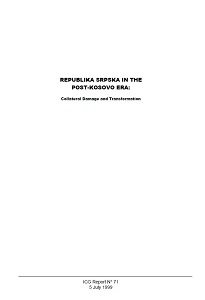REPUBLIKA SRPSKA IN THE POST-KOSOVO ERA: Collateral Damage and Transformation (ICG Report N° 71)
REPUBLIKA SRPSKA IN THE POST-KOSOVO ERA: Collateral Damage and Transformation (ICG Report N° 71)
Author(s): Author Not Specified
Subject(s): Security and defense, Inter-Ethnic Relations, Peace and Conflict Studies, Wars in Jugoslavia
Published by: ICG International Crisis Group
Keywords: Dayton agreement; Refugees return; war crimes;
Summary/Abstract: Repercussions from Kosovo continue to shake Republika Srpska (RS), and may prove a catalyst for further transformation and reform. The war’s collateral damage included severance of trade ties with the Federal Republic of Yugoslavia (FRY); a dramatic rise in unemployment; a sharp drop in production and state revenues; and a tide of Serbian refugees from FRY into RS. Despite this the security situation, which looked dangerous at the beginning of April, did not deteriorate out of control, and the government in Banja Luka was able to stabilise its position and survive. The government itself deserves credit for keeping its head throughout the crisis. The international community, especially OHR and the US government, did good work behind the scenes keeping the ruling Sloga coalition together. And a generally well-judged and lowkey response by SFOR managed to strike a balance between preserving security and not provoking incidents by its own actions. As Republika Srpska enters the post-Kosovo era it faces a crossroads, both economically and politically. RS now can move forward towards an integrated European future as part of BiH. Or it can move backwards, towards economic, social and political misery.
Series: ICG Balkans Report
- Page Count: 19
- Publication Year: 1999
- Language: English
- Content File-PDF
- Introduction

